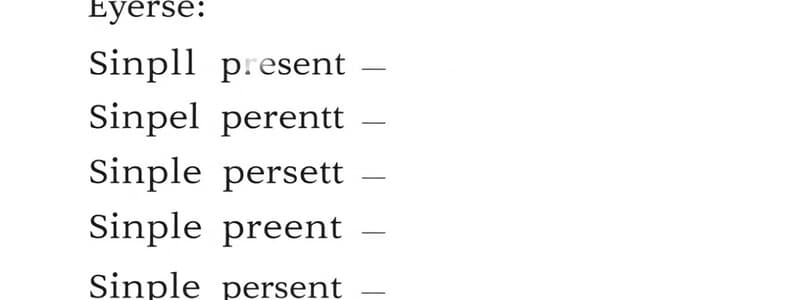Podcast
Questions and Answers
What type of action does 'BE + V-ing' primarily focus on?
What type of action does 'BE + V-ing' primarily focus on?
- The time frame of completion
- The result of the action
- The activity itself (correct)
- The duration since the action began
Which of the following sentences uses 'for' correctly in terms of duration?
Which of the following sentences uses 'for' correctly in terms of duration?
- I will complete the project since next week.
- I haven’t seen him for last year.
- I have lived here since three years.
- I slept for two hours last night. (correct)
Which of the following statements correctly differentiates 'for' and 'since'?
Which of the following statements correctly differentiates 'for' and 'since'?
- 'For' is used with a point of time and 'since' with a duration.
- 'For' indicates how long an action continues, while 'since' indicates when it started. (correct)
- 'For' can only be used in affirmative sentences whereas 'since' can also be negative.
- 'Since' is used for non-continuous actions and 'for' for ongoing actions.
In the context of the present perfect tense, what does asking 'How long?' imply?
In the context of the present perfect tense, what does asking 'How long?' imply?
What does 'Depuis' indicate when translating to English?
What does 'Depuis' indicate when translating to English?
Which sentence represents the correct use of the present perfect aspect?
Which sentence represents the correct use of the present perfect aspect?
Which form expresses an action that has occurred over a specified time frame?
Which form expresses an action that has occurred over a specified time frame?
What kind of verbs is 'BE + V-ing' less compatible with?
What kind of verbs is 'BE + V-ing' less compatible with?
What does the phrase 'Ça fait longtemps que je n'ai pas fait quelque chose' denote in English?
What does the phrase 'Ça fait longtemps que je n'ai pas fait quelque chose' denote in English?
How is 'for' used in relation to actions that have not been completed?
How is 'for' used in relation to actions that have not been completed?
What is the primary focus of the 'Simple' aspect as indicated in the context?
What is the primary focus of the 'Simple' aspect as indicated in the context?
What does the question 'How long has it been raining?' imply about the nature of the action?
What does the question 'How long has it been raining?' imply about the nature of the action?
Which expression correctly translates 'Depuis' into English when indicating a duration?
Which expression correctly translates 'Depuis' into English when indicating a duration?
In which situation would using 'for' be inappropriate according to the context?
In which situation would using 'for' be inappropriate according to the context?
What is a common misconception about the use of 'BE + V-ing' concerning stative verbs?
What is a common misconception about the use of 'BE + V-ing' concerning stative verbs?
Which of the following is an incorrect translation of the phrase 'Ça fait trois ans que je ne l'ai pas vue'?
Which of the following is an incorrect translation of the phrase 'Ça fait trois ans que je ne l'ai pas vue'?
Which of the following sentences illustrates the proper use of 'for' in the context of habitual actions?
Which of the following sentences illustrates the proper use of 'for' in the context of habitual actions?
Which of these options best describes the meaning of the phrase 'I haven't been sleeping well for the past few months'?
Which of these options best describes the meaning of the phrase 'I haven't been sleeping well for the past few months'?
What is the difference between using 'for' and 'since' as indicated in the information provided?
What is the difference between using 'for' and 'since' as indicated in the information provided?
Flashcards are hidden until you start studying
Study Notes
Present Perfect Continuous vs. Simple Present Perfect
- The present perfect continuous describes an action that started in the past and continues in the present, focusing on the duration of the action.
- The simple present perfect focuses on the result of the action that happened in the past.
How Long vs. How Much/Many
- The present perfect continuous is often used to answer "How long?" questions, indicating the length of time an action has been happening.
- The simple present perfect is more common for questions using "How much?" or "How many?", asking about the quantity or number of an action.
Verbs of State
- The simple present perfect is more suitable for verbs of state (e.g., love, know, understand), which describe a state of being or a condition.
- The present perfect continuous is less compatible with verbs of state.
For
- "For" indicates a duration of time, without specifying a specific starting point.
- "For" can be used with all tenses and aspects.
- Example: "I have been working here for five years."
For vs. In
- "For" expresses a duration, while "in" usually refers to a period of time.
- "For" is often used with the present perfect continuous to express an action in progress.
- "In" can be used with the simple present perfect to express a completed action within a specific period.
For vs. In - Negative Forms
- In negative forms, “for” expresses an action not done for a particular period.
- "In" expresses a completed action that hasn’t occurred within a specific period.
Depuis and Translating
- "Depuis" in French can indicate either a duration of time ("depuis dix ans") or a starting point ("depuis 2010").
- "Since" is used in English to translate both usages:
- "Depuis" + duration --> "for" + duration (e.g., "depuis dix ans" --> "for ten years").
- "Depuis" + starting point --> "since" + starting point (e.g., "depuis 2010" --> "since 2010").
Translating French Expressions
- Expressions like "Ça fait" + duration + "que" and "Il y a" + duration + "que" in French can translate to "for" or "in" in English, depending on the context.
- Both "for" and "in" can work with the simple present perfect to indicate a duration or specific period of time.
Present Perfect Simple vs. Present Perfect Continuous
-
The present perfect simple focuses on the result of a completed action, while the present perfect continuous emphasizes the duration of an ongoing action.
-
Both the present perfect simple and present perfect continuous can be used to express completed actions, with subtle differences in emphasis.
Using "How Long?" in Asking Questions
-
How long? can be used to ask about the duration of an activity (How long has it been raining?) or to ask about the length of time a process has been ongoing (How long has she been learning French?).
-
The present perfect continuous is often used when asking "How long?" questions about ongoing activities, while the present perfect simple is more common for completed actions.
Using For
-
The preposition for is used to express a duration of time and can be used with all tenses and aspects.
-
For expresses how long something has been happening, without specifying a starting point.
Using Since
-
"Since" in French can indicate either a duration (since ten years) or a starting point (since 2010).
-
In English, "since" is always used with a specific starting point (since 2010), while for is used with a duration (for ten years).
Translating "Depuis"
-
In French, the expression "Ca fait" followed by a duration of time and "que" can often be translated as either "for" or "in" in English.
-
The expression "Il y a" followed by a duration of time and "que" can also be translated as either "for" or "in" in English.
Studying That Suits You
Use AI to generate personalized quizzes and flashcards to suit your learning preferences.




